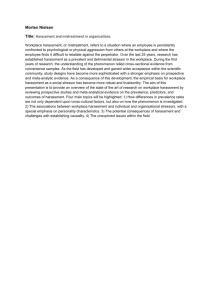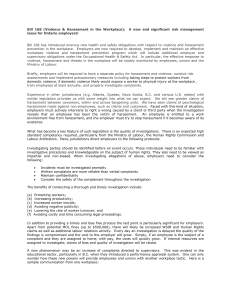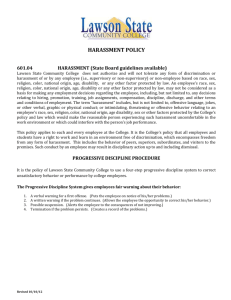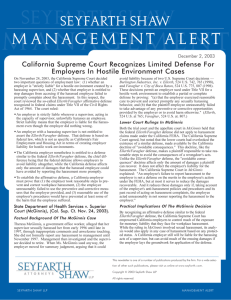to Prevent Workplace Harassment
advertisement
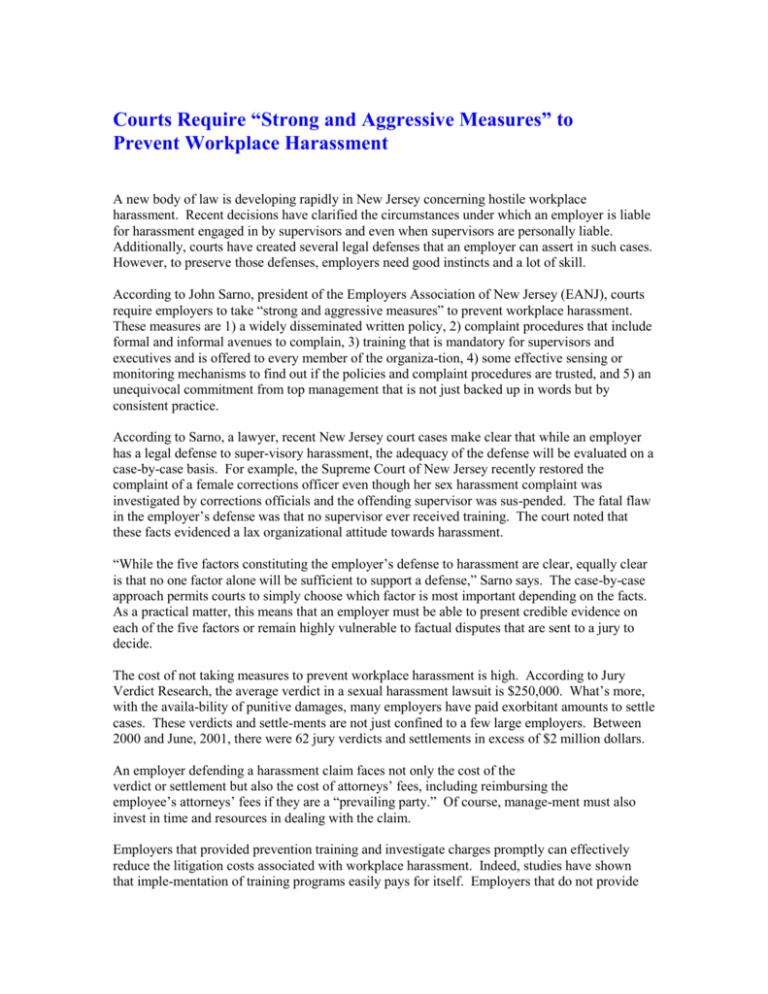
Courts Require “Strong and Aggressive Measures” to Prevent Workplace Harassment A new body of law is developing rapidly in New Jersey concerning hostile workplace harassment. Recent decisions have clarified the circumstances under which an employer is liable for harassment engaged in by supervisors and even when supervisors are personally liable. Additionally, courts have created several legal defenses that an employer can assert in such cases. However, to preserve those defenses, employers need good instincts and a lot of skill. According to John Sarno, president of the Employers Association of New Jersey (EANJ), courts require employers to take “strong and aggressive measures” to prevent workplace harassment. These measures are 1) a widely disseminated written policy, 2) complaint procedures that include formal and informal avenues to complain, 3) training that is mandatory for supervisors and executives and is offered to every member of the organiza-tion, 4) some effective sensing or monitoring mechanisms to find out if the policies and complaint procedures are trusted, and 5) an unequivocal commitment from top management that is not just backed up in words but by consistent practice. According to Sarno, a lawyer, recent New Jersey court cases make clear that while an employer has a legal defense to super-visory harassment, the adequacy of the defense will be evaluated on a case-by-case basis. For example, the Supreme Court of New Jersey recently restored the complaint of a female corrections officer even though her sex harassment complaint was investigated by corrections officials and the offending supervisor was sus-pended. The fatal flaw in the employer’s defense was that no supervisor ever received training. The court noted that these facts evidenced a lax organizational attitude towards harassment. “While the five factors constituting the employer’s defense to harassment are clear, equally clear is that no one factor alone will be sufficient to support a defense,” Sarno says. The case-by-case approach permits courts to simply choose which factor is most important depending on the facts. As a practical matter, this means that an employer must be able to present credible evidence on each of the five factors or remain highly vulnerable to factual disputes that are sent to a jury to decide. The cost of not taking measures to prevent workplace harassment is high. According to Jury Verdict Research, the average verdict in a sexual harassment lawsuit is $250,000. What’s more, with the availa-bility of punitive damages, many employers have paid exorbitant amounts to settle cases. These verdicts and settle-ments are not just confined to a few large employers. Between 2000 and June, 2001, there were 62 jury verdicts and settlements in excess of $2 million dollars. An employer defending a harassment claim faces not only the cost of the verdict or settlement but also the cost of attorneys’ fees, including reimbursing the employee’s attorneys’ fees if they are a “prevailing party.” Of course, manage-ment must also invest in time and resources in dealing with the claim. Employers that provided prevention training and investigate charges promptly can effectively reduce the litigation costs associated with workplace harassment. Indeed, studies have shown that imple-mentation of training programs easily pays for itself. Employers that do not provide these preventative measures expose themselves to punitive damages and the potential loss of an affirmative defense. It is with this in mind that the Center for Human Resources Management Studies at Fairleigh Dickinson University hosted a 3-part training series conducted by EANJ. The sessions provided an updated sum-mary of relevant case law, as well as exercises to help HR Administrators conduct an investigation of a sex harass-ment complaint and to be an effective deposition witness. The sessions were well-attended and very well received. According to Sarno, the 3-part series can be customized to meet individual employer training needs. -John Sarno John Sarno is President of the Employers Association of New Jersey (www.eanj.org), a nonprofit association supporting employers since 1916. Membership benefits include compliance training offered at employer locations.
